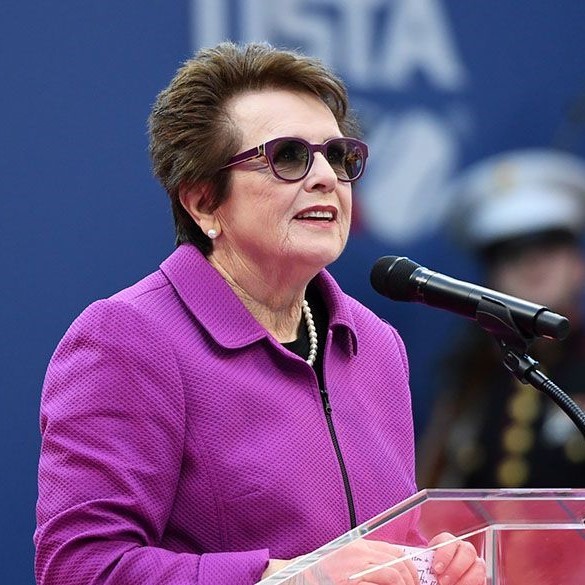
Three years ago, Billie Jean King was back in the spotlight, although this time she didn’t even break a sweat.
On a proverbial press tour ahead of the 2017 film “Battle of the Sexes,” King answered the prerequisite questions about Bobby Riggs, the famous exhibition in Houston, and her status as a tennis icon. Speaking to The Guardian, King was asked about her lifelong attention to activism.
“I was daydreaming (as a 12-year old) about my little tiny universe of tennis,” she recalled, “and I thought to myself: ‘Everybody’s wearing white shoes, white socks, white clothes, playing with white balls, everybody who plays is white. Where is everybody else?’”
“That was the moment I decided to fight for equality and freedom and equal rights and opportunities for everyone,” King said. “Everyone. Not just girls. Everyone.”
For that young visionary, it was the start of something bigger than tennis, greater than Wimbledon, and more powerful than her familiar chip and charge. Billie Jean Moffat – known today by her more recognizable surname – was on a mission to change the world.
* * *
In her lifetime, Billie Jean King has seen it all.
She reached her first of 18 Grand Slam finals at Wimbledon in 1963, as the nation struggled with unrest over the Vietnam War. She won for the third time in Britain in 1968, just as racial discourse erupted over the assassination of Dr. Martin Luther King, Jr. When the Stonewall Riots in Manhattan made headlines in 1969, Billie Jean was advancing to the ladies’ final at the All England Club.
Today, nearly 37 years after her retirement from the sport, the nation continues to struggle against what many would perceive as the most damaging pandemic of all – inequality. It is a battle King has waged for decades. Her resilience endures.
“I lived through the 1960s,” King tells USTAsocal.com, “and the big difference in the demonstrations of those days and the uprising we are seeing today is that the peaceful protesters of today are more inclusive and diverse, and the immediacy of the technology available to them allows them to connect, communicate and mobilize.
“We have reached a tipping point in society and in our history,” she continues. “This struggle has been going on for years and while we may have paid attention to it, we have not really listened to those who desperately need our help, especially people of color. We have not dealt with these issues as a society. We are starting to do that now. We need to change ourselves and change history.”
* * *
It’s no secret that Billie Jean King has charted an unwavering course, one that meets conflict head-on and yearns for meaningful resolution. The challenge from Riggs, a colorful and entertaining exhibition on its exterior, was at its core a powerful testimonial from both participants on gender equality. Months later, after founding the Women’s Tennis Association player union, King successfully lobbied the US Open to grant equal prize money to both men and women, an accomplishment that transcends to this day.
Firmly established as a trailblazer for women’s rights and gender parity, King’s influence extended to a new community in the late 1980s. Married since the age of 21 to promoter Larry King, Billie Jean soon came to an unexpected realization – she was gay.
“Fifty percent of gay people know who they are by the age of 13,” she said in a 2007 interview. “I was in the other 50%.”
King’s stature as the first “out” female professional athlete again cemented her stature as a civic pioneer. In addition to helping raise millions of dollars in support of the Elton John AIDS Foundation, King continues to be a vocal supporter of LGBT rights. Five years before she represented the United States in Sochi as an openly gay delegate to the US Olympic team (amidst homophobic intimidation from the host nation’s government), President Barack Obama bestowed upon her the Presidential Medal of Freedom, praising her ability to “change how women athletes and women everywhere view themselves and to give everyone, regardless of gender or sexual orientation… a chance to compete both on the court and in life.”
* * *
Rewind to the early 1970s when legendary recording artist Elton John, having struck a kinship with the tennis champion, approached songwriter Bernie Taupin to write a song dedicated to his friend Billie Jean and her professional tennis team. Taupin responded quite simply, “I can’t write a song about tennis.”
Instead, the writer crafted an enduring and adaptable anthem that resonates as powerfully today as it did 45 years ago. Originally penned to illustrate the city’s musical diversity of soul and funk, the lyrical interpretation of “Philadelphia Freedom” – a titular nod to King’s team of the same name – has remained fluid with each passing generation. Its underlying message – the confidence to be one’s self, expressed through music, or sport, or art, or politics, or literature – has long been adopted in times of strife and conflict.
“Shine the light,” the song says, “through the eyes of the ones left behind. Shine the light, shine the light.”
Through the eyes of George Floyd, Breonna Taylor, Matthew Shepard, and countless others whose names never reach the headlines, one shining light refuses to diminish even after seventy-six remarkable years.
“Historic change comes when we listen, learn and lead,” King reminds. “I want people to do four things – educate, donate, volunteer and vote. Every single one of us is an influencer and every single one of us has the power to make the change necessary in our society.”
Chris Evert once said that Billie Jean King’s biggest weakness was her impatience. In an imperfect world that struggles to find peace and unity, impatience may be the greatest strength we can borrow from one of the game’s all-time greats.